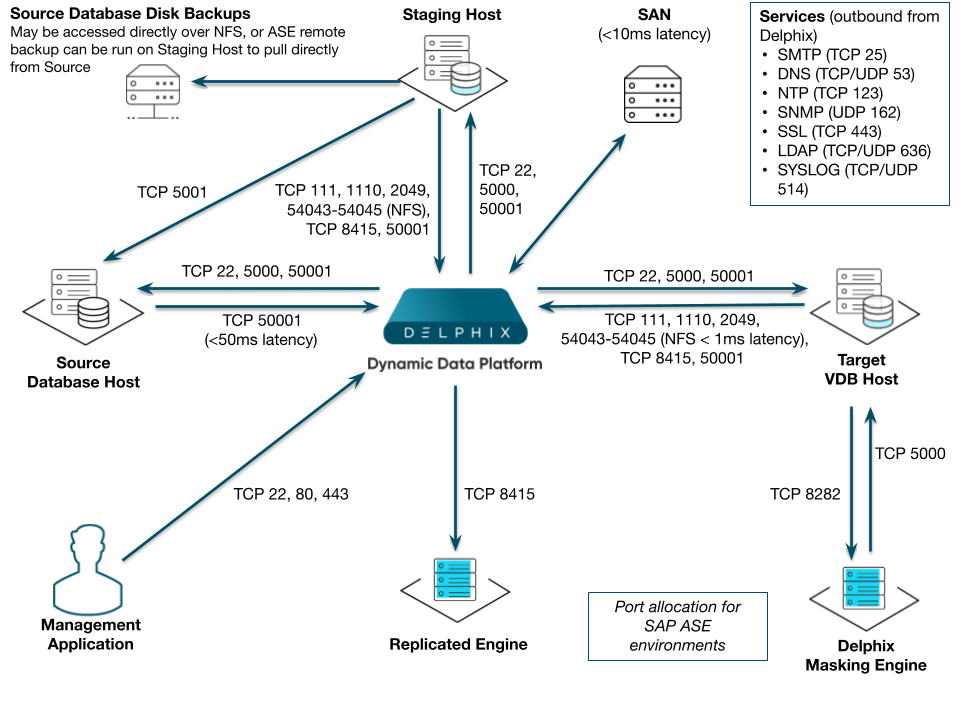Network and connectivity requirements for SAP ASE environments
General outbound from the Delphix engine port allocation
Protocol | Port numbers | Use |
|---|---|---|
TCP | 25 | Connection to a local SMTP server for sending email |
TCP/UDP | 53 | Connections to local DNS servers |
UDP | 123 | Connection to an NTP server |
UDP | 162 | Sending SNMP TRAP messages to an SNMP Manager |
TCP | 443 | HTTPS connections from the Delphix Engine to the Delphix Support upload server |
TCP/UDP | 636 | Secure connections to an LDAP server |
TCP | 8415 | Connections to a Delphix replication target. See Configuring Replication |
TCP | 50001 | Connections to source and target environments for network performance tests. |
General inbound to the Delphix engine port allocation
Protocol | Port number | Use |
|---|---|---|
TCP | 22 | SSH connections to the Delphix Engine |
TCP | 80 | HTTP connections to the Delphix GUI |
UDP | 161 | Messages from an SNMP Manager to the Delphix Engine |
TCP | 443 | HTTPS connections to the Delphix Management Application |
TCP | 8415 | Delphix Session Protocol connections from all DSP-based network services including Replication, SnapSync for Oracle, V2P, and the Delphix Connector. |
TCP | 50001 | Connections from source and target environments for network performance tests via the Delphix CLI. |
Firewalls and intrusion detection systems (IDS)
Production databases on source environments (for dSources) are often separated from the non-production environment by firewalls. Firewalls can add milliseconds to the latency between servers. Accordingly, for best performance, there should be no firewalls between the Delphix Engine and the virtual database (VDB) target environments. If the Delphix Engine is separated from a source environment by a firewall, the firewall must be configured to permit network connections between the Delphix Engine and the source environments for the application protocols (ports) listed above.
Intrusion detection systems (IDSs) should also be made permissive to the Delphix Engine deployment. IDSs should be made aware of the anticipated high volumes of data transfer between dSources and the Delphix Engine.
Connection requirements for SAP ASE environments
The Delphix Engine uses an SSH connection to each source environment and SAP ASE client connections to the SAP ASE instances on the source environment.
The Delphix Engine uses an SSH connection to each target environment, NFS connections from each target environment to the Delphix Engine, and SAP ASE JDBC connections to the virtual databases on the target environment.
Port allocation for SAP ASE environments
The following diagram describes the port allocations for SAP ASE environments. It illustrates the ports that we recommend to be open from Delphix to remote services, to the Delphix Engine, and to the Target Environments.

Refer to Managing SAP ASE Environments for information on SAP ASE environments. The Delphix Engine makes use of the following network ports for SAP ASE dSources and VDBs:
Outbound from the Delphix engine port allocation
Protocol | Port numbers | Use |
|---|---|---|
TCP | Configuration dependent | JDBC Connections to the SAP ASE instances on the source environments |
Inbound to the Delphix engine port allocation
Protocol | Port number | Use |
|---|---|---|
UDP | 33434-33464 | Traceroute from source and target database servers to the Delphix Engine (optional) |
TCP/UDP | 111 | Remote Procedure Call (RPC) port mapper used for NFSv3 mounts |
TCP | 2049 | NFS client from target hosts to the Delphix Engine (NFSv3 and NFSv4) |
TCP | 1110 | Network Status Monitor (NSM) client from target hosts to Delphix Engine |
TCP | 54043 | Client mount daemon (NFSv3 only) |
TCP | 54044 | Lock state notification service (NFSv3 only) |
TCP | 54045 | Network Lock Manager (NLM) client from target hosts to Delphix Engine (NFSv3 only) |
Port allocation between source and staging target environments
Protocol | Port numbers | Use |
|---|---|---|
TCP | Configuration dependent | SAP ASE Remote Backup Server protocol. Applies if linking using the New Full Backup option, or if linking with the Remote Backup Server option. |
Port allocation between staging target environments and shared backup fileserver
Protocol | Port numbers | Use |
|---|---|---|
TCP/UDP | NFS and related port numbers:
| NFS mount point exported by an NFS shared backup fileserver. Applies if linking using the Local Backup Server option. |
AppData port requirements
The use of AppData requires the following ports/protocols. Two important notes about these specifications:
The next release of the Delphix Engine will significantly augment the port/protocol utilization of AppData. The upcoming-only requirements have been marked with a *.
AppData V2P uses RSYNC to export to the target. RSYNC between the target and Delphix Engine is not required for general virtualization usage. The V2P-only requirements have been marked with a ^.
From Source to Delphix Engine | From Delphix Engine to Source | From Target to Delphix Engine | From Delphix Engine to Target |
|---|---|---|---|
RSYNC to rsyncd (TCP Port 873) | RSYNC to rsyncd (TCP Port 873) | DSP (Default TCP Port 8415) | DSP (Default TCP Port 8415) |
DSP (Default TCP Port 8415) | SSH (TCP Port 22) | NFS | SSH (TCP Port 22) |
*NFS | DSP (Default TCP Port 8415) | ^RSYNC to rsyncd (TCP Port 873) | ^RSYNC to rsyncd (TCP Port 873) |
